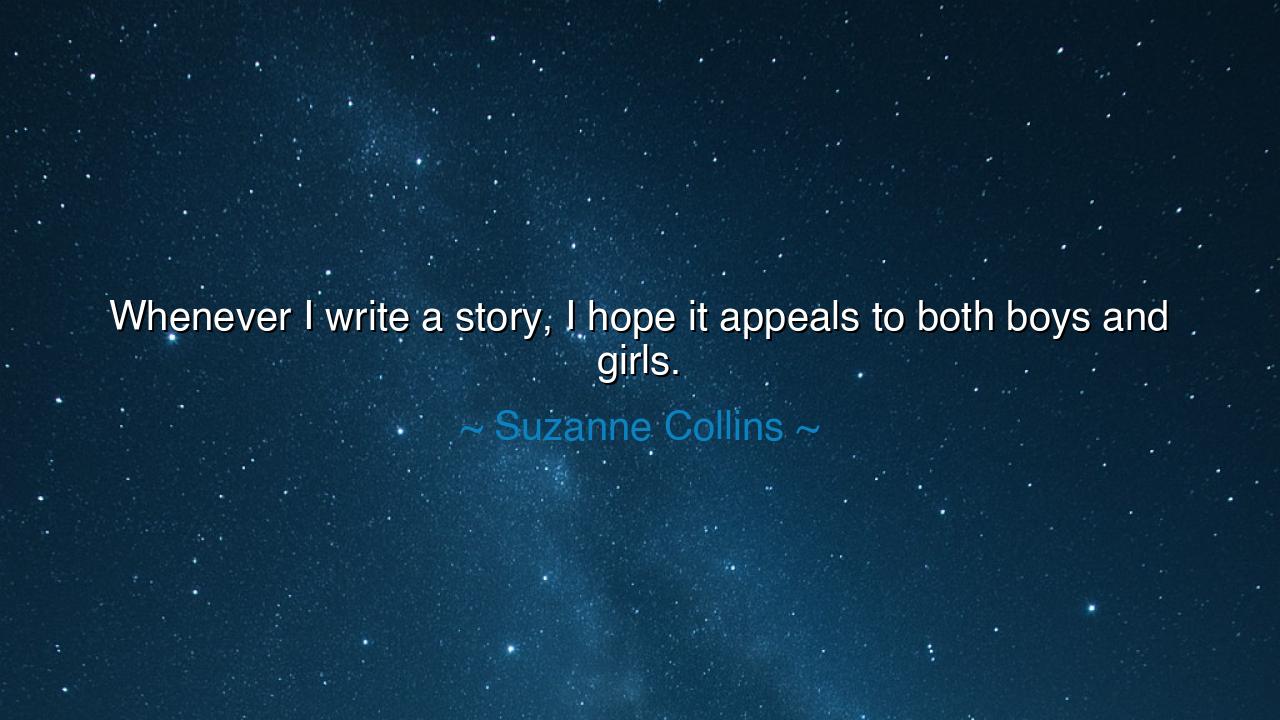
Whenever I write a story, I hope it appeals to both boys and






Suzanne Collins once said: “Whenever I write a story, I hope it appeals to both boys and girls.” These words, simple yet profound, reveal the heart of a storyteller who writes not to divide, but to unite. In them lies the ancient belief that art — true art — belongs to all humanity. Collins, the author of The Hunger Games, speaks as one who understands that the deepest stories are not about gender or tribe, but about the shared struggles that make us human: courage, sacrifice, love, survival, and the longing for freedom. Her words call us to remember that the greatest tales transcend walls, for they are written in the language of the soul.
The origin of this quote lies in Collins’s philosophy as both a writer and a human being. Having written for television before creating her novels, she often saw how stories were shaped by markets — labeled “for boys” or “for girls,” divided and limited by assumption. But Collins, inspired by the myths of ancient Greece and the moral questions of modern war, sought something greater. In The Hunger Games, she forged a world where both strength and compassion, both action and thought, belonged to everyone. Her heroine, Katniss Everdeen, was not designed to please one side of the audience, but to awaken empathy in all. The story of Panem is not a tale of gender, but of humanity under pressure, and thus, it speaks to everyone who has ever loved, lost, or stood against injustice.
In the style of the ancients, we might say that Collins’s words echo the wisdom of the philosophers who believed that the purpose of art is not division, but harmony. Plato taught that music, poetry, and drama shape the soul of a people. The Greeks told stories of gods and heroes that appealed to all — men and women, young and old — because they spoke of virtues and failings that belong to every heart. When Collins speaks of appealing “to both boys and girls,” she is, in truth, renewing this ancient tradition: the belief that stories are mirrors of the universal spirit. To limit them by gender is to darken the mirror, to rob the next generation of seeing themselves fully reflected.
Consider, for example, the timeless tale of Joan of Arc. Her story has inspired men and women alike for centuries — not because she was a woman, but because she was brave. She stood before kings and armies with nothing but faith and fire, proving that the human spirit, when ignited by purpose, transcends all boundaries. The same can be said of Collins’s Katniss, or of any true hero who rises not as a symbol of one gender, but as a beacon for all. When a story reveals the light of the human heart, it ceases to belong to one kind of person — it belongs to all who have ever struggled to be free.
The power of universal storytelling lies in its ability to dissolve walls. In a time when the world often divides itself — by culture, by identity, by ideology — Collins reminds us that imagination is the bridge that reconnects us. A boy reading The Hunger Games can see strength in vulnerability; a girl can see leadership in defiance. Through story, empathy grows — and where empathy grows, peace becomes possible. This is the alchemy of art: that in sharing the trials of another, we begin to understand our own.
But Collins’s words also carry a lesson for creators and thinkers of every age. True communication begins where labels end. Whether in writing, in teaching, or in living, one must seek the essence beneath appearance. Speak not to one kind of person, but to the shared humanity in all. The artist’s duty — and indeed, the human duty — is to awaken unity where division reigns. To appeal “to both boys and girls” is not to dilute one’s message, but to strengthen it — to find the truths that bind all hearts together.
Let this, then, be the lesson: when you create, when you speak, when you act, let your purpose rise above the boundaries of difference. Seek to touch not the surface of people, but their souls. Tell stories that remind others that they, too, belong. For the world needs less separation and more shared light. Suzanne Collins’s words remind us that the greatest stories are not written for “some” — they are written for “all.” And in the end, this is the legacy of every great creator — to speak in a voice that unites, and to leave behind words that echo, not in one kind of heart, but in the heart of humankind itself.






AAdministratorAdministrator
Welcome, honored guests. Please leave a comment, we will respond soon